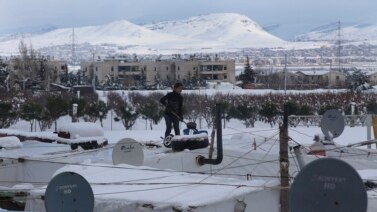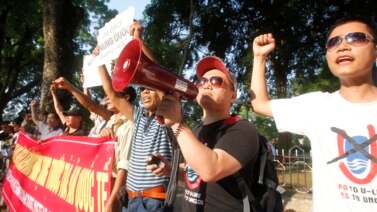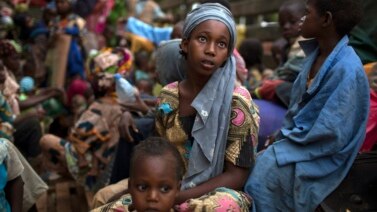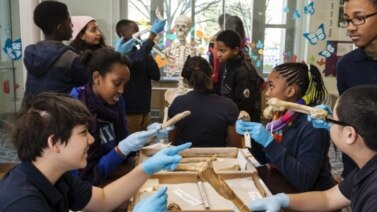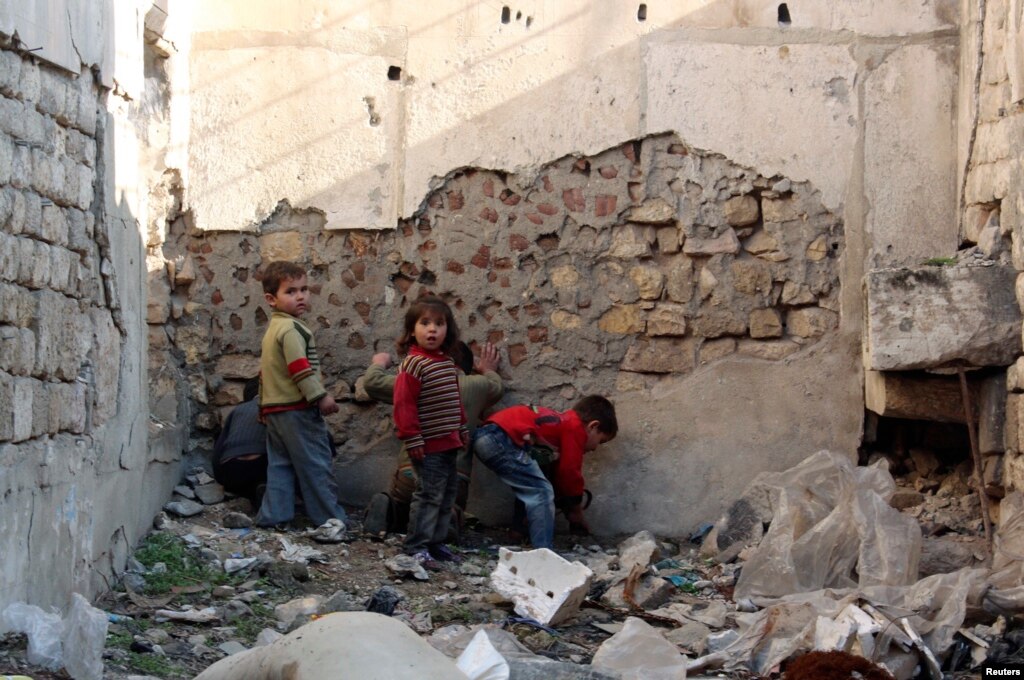
Hello, and welcome to As It Is from VOA Learning English! I’m Steve Ember in Washington.
Today on our program, we report on efforts by one group to improve education in Myanmar, also known as Burma. The government has carried out many reforms since parliamentary elections and the end of military rule in 2011. But education remains a big issue, especially in rural areas. Jeri Watson will have more on the story later in the program.
But we begin with a report about Syria. The United Nations has warned that Syrian children are suffering as a result of the country’s three year-long conflict. The UN says many of the children have developed emotional problems, are separated from their parents and are not in school. Milagros Ardin has this report.
UN: More Than One Million Syrian Children Are Refugees
The United Nations says more than one million Syrian children are registered with its refugee agency, the UNHCR. Most of them now live in Lebanon and Jordan.
These boys and girls may have escaped from the fighting, but they continue to suffer the effects of war.
The UN agency says 75 percent of the 1.1 million children it has registered are under the age of 12. The agency is urging international donors to increase financial support to refugee families. It says the money could, in turn, help displaced children.
Brian Hansford is a spokesman for the UNHCR.
“It illustrates the immense suffering. We are talking here of psychological distress, withdrawal, anger, loneliness, fractured families and widespread use of child refugees as labor.”
The UN report noted efforts to keep Syrian refugee children in school. But as of September, it said, more than 100,000 of those in Jordan were not attending classes. And it said twice that number could be out of school in Lebanon. Disabled children are said to be having an even harder time.
Many children, especially boys, are out of school because their families need them for work. Brian Hansford says the report found that 10 percent of Syrian refugee children in the area are working for a living. Many work long hours in dangerous conditions.
“One child interviewed, he was burned by hot oil in a restaurant, for example. Another cut his hand while fixing a car mirror, and a third was beaten by the son of his boss.”
Refugee babies are also at risk, often lacking necessary documents. That is because babies born in Syria are not registered if their families fled the country, or if they were born as refugees in Lebanon or Jordan. Mr. Hansford says the lack of a birth certificate can create problems for these children later in life.
“A birth certificate is a vital document to protect against risks such as statelessness. And so without a birth certificate, people can have difficulties later enrolling in schools, or getting health care and other services.”
The report also found that many Syrian children are growing up without one or both parents. More than 70,000 Syrian refugee families live without fathers. And nearly 4,000 refugee children are living without or are separated from both parents. The UN operates centers for these children in refugee camps. The centers provide social services while workers try to reunite the youngsters with relatives.
I’m Milagros Ardin.
You are listening to As It Is from VOA Learning English. I’m Steve Ember.
Burma, also known as Myanmar, is one of the poorest countries in the world. The United Nations says people there earn an average of about $460 a year. For more than 20 years, the military ruled the country. During that time, the international community limited assistance to the country because of its record on human rights. Myanmar now has an elected government, and international aid has begun to arrive. But as we hear from Jeri Watson, there are still few resources for education in rural villages.
Building Schools in Burma
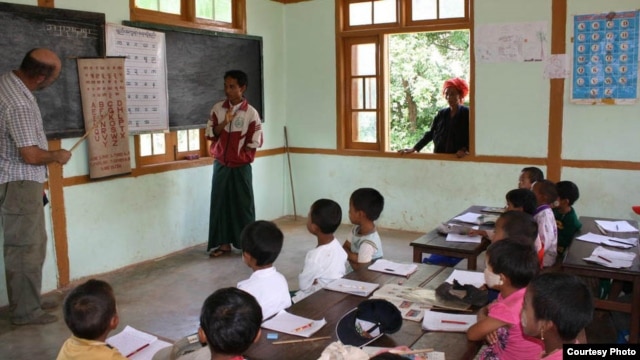
Bob Cornwell and a group called Build a School in Burma are trying to change that. Three years ago, he was a financial adviser to several foreign governments. Today, he is building schools in Burma.
“We’re really trying to help kids on the margin who wouldn’t otherwise get an education, and kids not having an education is just a recipe for every kind of personal disaster.”
He met some of those children in 2010. He and a friend were travelling from village to village in the northwestern province of Burma.
“None of these villages have electricity. Many of them are not really accessible even by road. And lots of kids, maybe like five on average per family -- no school.”
Bob Cornwell returned to his home in California. Back home, he learned that the cost of building a primary school in Burma was just $15,000 to $20,000. So he sold his interest in a financial consulting company that he had started 25 years earlier and returned to Burma. He looked for villages that would give land and construction help in exchange for a school.
Rick Heizman, an expert on Burmese music, volunteered to help. He had been working on humanitarian and education projects in Burma for more than 20 years.
Rick Heizman is married to a well-known Burmese harpist, Su Wei. They live in San Francisco, California, but they return to Burma often to visit the school projects. Su Wei says the children are excited to learn to read and write. And she says the parents are happy that their children can get an education without having to leave their village.
“The school is inside their village, nearby, so at least they don’t have to worry about taking the kids to the school, faraway places, you know, like that.”
Bob Cornwell says the group works with community leaders.
“They have a very good connection to the local people. They understand what the needs are. So having someone who really understands the local situation is crucial. They’re on the ground there all the time, so we’ve really focused on those groups.”
Bob Cornwell is applying for grants and asking for donations so he can build more schools. He says spending his retirement years this way has made him happier than he ever imagined he would be.
I’m Jeri Watson.
As It Is is a production of VOA Learning English. I’m Steve Ember. Thanks so much for listening!
